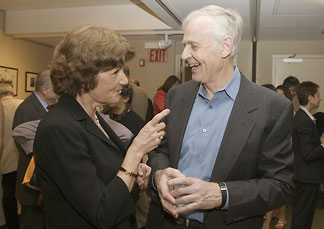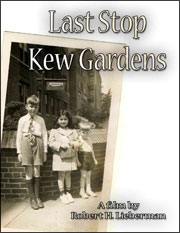Robert Lieberman explores old neighborhood in new film
By Daniel Aloi

NEW YORK -- For Robert H. Lieberman, a longtime member of Cornell's physics faculty, his new documentary, "Last Stop Kew Gardens," is a homecoming and sets the stage for a reunion with others who grew up in his Queens neighborhood in the 1940s and '50s.
At the film's world premiere April 30 at the Center for Jewish History in Manhattan, Lieberman noted that "Kew Gardens was a unique point in time and history and has not been repeated. It existed for a fleeting moment in time." A senior lecturer in Cornell's Center for Learning and Teaching as well as a filmmaker and novelist, he recalled, "We were different. Nearly all of our parents spoke German; most of our parents were refugees."
With a large concentration of Jewish immigrant families who fled the Nazis, Kew Gardens -- "a village inside the big city" -- has produced a number of accomplished professionals and celebrities, including television personality Jerry Springer, "St. Elsewhere" and "Northern Exposure" creator Joshua Brand, NBC Today Show music critic Rona Elliott, comedian Robert Schimmel and former Penguin Books CEO Peter Mayer.
"We all went to the same public school -- P.S. 99 -- and there we learned to be American. It was a very special neighborhood, partly because it was geographically limited," said art historian Monica Strauss, a consultant on the film who met Lieberman at an art gallery in Stockholm and discovered they had common roots.
Springer, interviewed in the film with his sister, Evie Springer Strauch, said his parents undertook "the Americanization of Gerald," sending him to camp and giving him other opportunities. "I became the typical American boy," he said.
The documentary came about after Lieberman wrote an online article in 2005 about his Kew Gardens childhood, and he started hearing from classmates and former neighbors. "I didn't search anybody out; they came to me," he said. "I was opening a large door."
The film details Lieberman's personal rediscovery of what it meant to grow up there in the years during and after World War II. He recalled its European flavor, its mix of family homes, delis and bakeries, and his days spent exploring in the nearby woods.
His family background was typical -- his parents fled Vienna in 1938 with his older brother, George; Lieberman's father, Oscar, was a lawyer with three doctorates but was not able to practice in America, and instead went into the printing business in his adopted country.
"The people who came out of Kew Gardens did so well [because] our parents were well-educated," said Dan Ein, a Washington, D.C., physician.

Lieberman left Kew Gardens after high school more than 40 years ago and only returned when he began work on the film. It was an opportunity, he said, "to reconnect with the place and the people. I got to meet people I hadn't seen in four or five decades. I think I'm doing it because of the enthusiasm of others; they buoyed me up and carried me on."
Lieberman shot more than 65 hours of high-definition video for "Last Stop Kew Gardens." He wants to prepare a final cut of the film for broadcast in the United States and Europe and film festivals. Lieberman's 2005 comedy "Green Lights" was released by his company, Ithaca Movies Inc., and screened in cities across America and in Manila.
"Robert is a man who makes up a dream, and then he gets everyone else to follow him," said associate producer Mike Rakosi, another Kew Gardens native.
For more information, visit http://www.kewgardensmovie.com/.
Media Contact
Get Cornell news delivered right to your inbox.
Subscribe